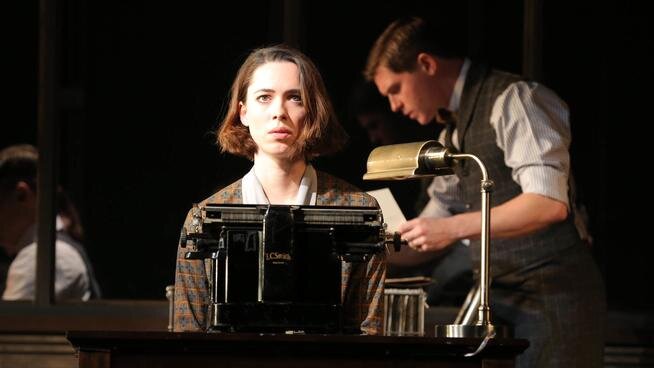Machinal
The dark, grim and gritty production of Machinal, Sophie Treadwell’s 1928 play about the confines of society, is currently shining a much-needed light on our culture.
Treadwell’s work, inspired by Ruth Snyder, the first New York woman to be put to death by the electric chair for the murder of her husband, has been given a stunning revival by the Roundabout Theatre Company. This aesthetically and emotionally stimulating production, starring Rebecca Hall in an impressive Broadway debut, provokes countless thoughts about gender roles and societal conventions, both in the 1920s and now.
Machinal introduces the audience to Young Woman, an office worker who feels suffocated by her life, and whose only foreseeable escape is to marry Husband, (Michael Cumpsty, once again playing the spurned man). Unsatisfied in her marriage — at first she cannot bear the touch of her husband — she finds solace in the arms of Lover (Morgan Spector), as well as inspiration as to how she might, at last, find freedom from the endless mechanical rotations of her life.
Impressively staged on Es Devlin’s set, which resembles a machine in its nonstop steady rotating of scenes, Machinal offers a blunt, unforgiving look at the stifling confines of Young Woman’s life. She cannot even ride the subway to work without needing escape from the tight limits of the car, and when she leaves her office, she goes home to her mother (Suzanne Bertish), with whom she does not share a close or comforting relationship.Despite her disgust with Husband, Young Woman marries him and eventually has a child; the post-natal scene in the hospital, where she is clearly struck with severe postpartum depression, is especially moving.
The script of Machinal includes a few lengthy monologues of the protagonist’s stream of consciousness, depicting her panic with the life the surrounds her — and seemingly suffocates her - as well as the lack of options for escape. Machinal clearly portrays how suffocated and silenced women in that time were — when Young Woman doesn’t want to breastfeed, the doctor simply tells her she has to and makes a patronizing remark about “hysterical” women; in fact, in the hospital, the only person who actually listens to the new mother is the female nurse, who is silenced by the various men around her. (Young Woman is so visibly distraught in this scene, that when it began, with her slumped limply in a bed, staring straight forward without blinking, I thought she was in a mental institution.)
As the Husband, Cumpsty gives a solid performance; the steady deadpan delivery of his monotonous lines is especially effective. It’s clear he is a product of his time, and he knows no other way to exist, even if it is infuriating when his wife begins sobbing uncontrollably on their wedding night, he calmly states, “There’s nothing to cry about… give us a kiss!” Spector is also very good as the Lover, giving a performance of nuance and appeal. It's easy to see how Young Woman is so susceptible to his charms and the idea of freedom that he personifies.
Hall is outstanding. In her Broadway debut, she is captivating in a complicated and demanding role. Her emotional journey is a lengthy one and she delivers solidly, evoking sympathy even when committing cold-blooded murder and lying about it on the stand in court.
Seeing Machinal was inspiring on many levels, especially after learning more about the life of the playwright, who was a driven and dedicated journalist as well. I was so happy to see a play written by a woman, directed by a woman and about a woman that succeeded in every possible aspect of the production. Watching this production within the context of the 20th-century culture, where women’s reproductive rights are still attempting to be limited, and the Purity Myth, attempting to move back to traditional gender roles, still sweeps areas of the world — as well as an industry where women are still outnumbered by men in leadership roles by a great margin (the New York Times recently reported that four out of five plays on Broadway are directed by men — this play served as a call to action for me, personally, and, when reading the news following this play, I felt the need to repeat Young Woman’s frantic statement of, “I’ll not submit!”

